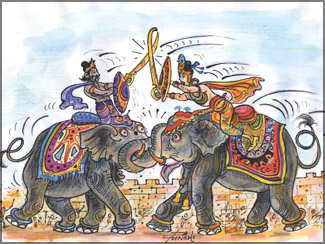Heritage Splendour
Dutugemunu wins the war with Elara
In our last Heritage Splendour article, we wrote about how Dutugemunu
became King of Ruhuna after the death of King Kavantissa. Today we
feature how he decided to launch his war against King Elara to liberate
the entire country,without stopping at being only the King of Ruhuna.
 With his ten generals (giant warriors), King Dutugemunu took over and
occupied Elara’s well-protected fortress called Vijithapura. With his ten generals (giant warriors), King Dutugemunu took over and
occupied Elara’s well-protected fortress called Vijithapura.
The Sinhala army went along the road from Dambulla to Anuradhapura,
attacking another fortress. Before long, Mahela Nagara was also captured
by Dutugemunu. Then he decided to attack Anuradhapura, where Elara was.
Dutugemunu realised the danger of fighting inside the city and wanted to
avoid it. So he waited outside the city, watching the movements of his
enemy.
He built a wewa and treated the wounded soldiers during this time. He
collected many strong men to increase the numbers of his army for the
final battle.
Meanwhile, Elara was distressed when he received the news of the
number of fortresses that were conquered by Dutugemunu. He wanted to
consult his ministers and generals and get their advice as to what
should be done to stop the advance of Dutugemunu’s army.
They also advised Elara about the danger of fighting inside the city
walls. It was then decided to meet Dutugemunu outside, in an open
battle. Elara had 30,000 men on his side, ready to confront Dutugemunu’s
army.
At this stage, Elara decided to fight alone with Dutugemunu. Dressed
in full armour, he got on his elephant Mahapabbata, and together with 20
warriors who were his bodyguards, marched towards Dutugemunu who was
waiting for him. Dutugemunu hurriedly consulted his mother Vihara Maha
Devi, and summoned his ministers for advice. It was then decided to meet
Elara and his army.
The giant Nandimithra stood on the right of Dutugemunu, while the
giant Suranimala stood on the left. Both sides advanced and met in
battle.
At the beginning, Dutugemunu lost some of his men. Elara’s army was
very powerful, and to prevent a further loss of his men, Dutugemunu’s
army stopped moving forward. The fight raged on.
Dutugemunu was surrounded by Elara’s men who saw the weakness of the
enemy. Elara’s general Dighajantu made his way forward to fight with
Dutugemunu. He was getting nearer and nearer.
Suranimala sensed the danger ahead and challenged Dighajantu, who
stopped rushing towards Dutugemunu. Instead, he turned towards
Suranimala with his sword. He raised the sword and brought it down with
a powerful force on Suranimala who avoided the blow by holding out his
shield. The sword slipped and fell to the ground.
Dighajantu was injured. There was pain on his face; Suranimala was
also advancing towards him. Quickly, Dighajantu bent down to pick up the
fallen sword. Suranimala held his sword tightly and with lightning
speed, dealt Dighajantu a blow. Dighajantu could not avoid the blow and
fell with a loud cry that was heard throughout the battlefront.
Meanwhile, Elara’s brother Bhalluka had been advancing towards the
capital city Anuradhapura from the day he landed on the shores of Lanka.
On hearing this, Dutugemunu decided to meet him before he reached the
city gates.
After consulting his ministers on what action to take, Dutugemunu
mounted his favourite elephant Kandula, with Phussadeva who was known
for his marksmanship sitting beside him. They saw that Bhalluka was
advancing at the head of an army of soldiers.
Suddenly, Kandula started retreating. Dutugemunu was surprised and
alarmed. He thought for a while and addressed his faithful general,
“Before this, in 28 battles, Kandula never retreated; what does this
mean, Phussadeva?” Phussadeva thought of re-assuring the King.
He knew that the King was superstitious and would believe that
Kandula’s unusual retreat was a sign of defeat. Phussadeva said: “O
King, look for the place of victory where the elephant drew back. At the
place of victory, he will halt. Let us take our stand where Kandula
stood”.
There was no alternative for Dutugemunu but to fall back.Bhalluka, in
his shining armour, came forward to meet Dutugemunu. He did not act in
haste, but looked straight at the King and addressed him in a mocking
manner. On hearing the insulting words, Dutugemunu covered his mouth
with the blade of his sword and replied Bhalluka. Bhalluka grew angry
and said, “I will send an arrow into your mouth”.
Saying this, he drew his bow and arrow and shot an arrow at
Dutugemunu. Instantly, Dutugemunu held his sword in his mouth and
prevented the arrow striking his face. It struck on the blade of the
sword and fell on the ground. Bhalluka thought his arrow had struck
Dutugemunu in the mouth, and cried out joyfully.
It was then that Phussadeva, who was seated behind Dutugemunu, shot
an arrow into the mouth of Bhalluka. The arrow flew close to
Dutugemunu’s earring before hitting Bhalluka. Bhalluka fell to the
ground in pain with a loud cry and at the same time, a loud shout of
victory was heard from those around them.
That evening, the King’s palace was decorated brightly and lit up
with lamps. The sweet smell of fragrance drifted around. There was
dancing and rejoicing throughout the night, to celebrate the victory.
Although Dutugemunu had his mighty warriors, the Dravidians were well
fortified in a large and strong fortress which kept Dutugemunu’s army at
bay. Kandula, then given the Herculean task of crushing down the
fortress, had charged with such fiery force and power that it crumbled
the fort and brought the enemy out, who were no match for Dutugemunu’s
army.
King Dutugemunu in his historic war with King Elara had an army
consisting of eth, as, riya and pabala (elephants, horses, chariots and
soldiers). It is said that the elephant army consisted of over 1000
tuskers!
Compiled by Janani Amarasekara |
